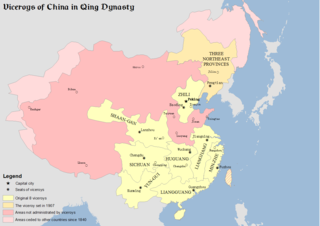
The Chahars are a subgroup of Mongols that speak Chakhar Mongolian and predominantly live in southeastern Inner Mongolia, China.

The Revolt of the Three Feudatories, also known as the Rebellion of Wu Sangui, was a rebellion in China lasting from 1673 to 1681 in the Qing dynasty (1644–1912) during the early reign of the Kangxi Emperor. The revolt was led by the three lords of the fiefdoms in Yunnan, Guangdong and Fujian provinces against the Qing central government. These hereditary titles had been given to prominent Han Chinese defectors who had helped the Manchu conquer China during the transition from Ming to Qing. The feudatories were supported by Zheng Jing's Kingdom of Tungning in Taiwan, which sent forces to invade Mainland China. Additionally, minor Han military figures like Wang Fuchen and the Chahar Mongols also revolted against Qing rule. After the last remaining Han resistance was put down, the former princely titles were abolished.

The Green Standard Army was the name of a category of military units under the control of Qing dynasty China. It was made up mostly of ethnic Han soldiers and operated concurrently with the Manchu-Mongol-Han Eight Banner armies. In areas with a high concentration of Hui people, Muslims served as soldiers in the Green Standard Army. After the Qing consolidated control over China, the Green Standard Army was primarily used as a police force.

Zheng Jing, Prince of Yanping, courtesy names Xianzhi (賢之) and Yuanzhi (元之), pseudonym Shitian (式天), was a 17th-century Chinese warlord, Ming dynasty loyalist and ruler of the Kingdom of Tungning in Taiwan.
The History of Ming or the Ming History is one of the official Chinese historical works known as the Twenty-Four Histories. It consists of 332 volumes and covers the history of the Ming Dynasty from 1368 to 1644. It was written by a number of officials commissioned by the court of Qing Dynasty, with Zhang Tingyu as the lead editor. The compilation started in the era of the Shunzhi Emperor and was completed in 1739 in the era of the Qianlong Emperor, though most of the volumes were written in the era of the Kangxi Emperor.

Geng Jingzhong was a powerful military commander of the early Qing dynasty. He inherited the title of "King/Prince of Jingnan" (靖南王) from his father Geng Jimao, who had inherited it from Jingzhong's grandfather Geng Zhongming.

Shang Kexi was a Chinese general of the Ming and Qing Dynasties. His family had migrated to Liaodong in 1576 and his father, Shang Xueli, served in the army guarding the northeast frontier. As his father did, Shang Kexi joined the army and guarded the frontier against the attack of the Jurchens. With the decay and fall of the Ming Emperors, Shang Kexi sought better fortune in the service of the Qing Dynasty and he was one of the most powerful generals that surrendered to the Qing. He fought for the Qing in Southern China and established his power in Guangdong where he ruled the territory as his own domain amassing wealth and possessing a trained army.

The Viceroy of Yun-Gui, fully referred to in Chinese as the Governor-General of Yunnan and Guizhou Provinces and the Surrounding Areas Overseeing Military Affairs and Food Production, Director of Civil Affairs, was one of eight regional viceroys in China proper during the Qing dynasty. The Viceroy controlled Yunnan and Guizhou (Kweichow) provinces.

Shang Zhixin was a major figure in the early Qing Dynasty, known for his role in the Revolt of the Three Feudatories. He was Prince of Pingnan, inheriting his position from his father, the surrendered Ming Dynasty general Shang Kexi.
Mạc Kính Vũ (莫敬宇, ?–?) was the tenth emperor of the Mạc dynasty. He reigned from 1638 – 1677.
Events from the year 1673 in China.
Events from the year 1674 in China.
Events from the year 1675 in China.
Events from the year 1677 in China.
Events from the year 1678 in China.
Events from the year 1679 in China.
Events from the year 1680 in China.
Events from the year 1681 in China.
Events from the year 1682 in China.
Events from the year 1687 in China.








